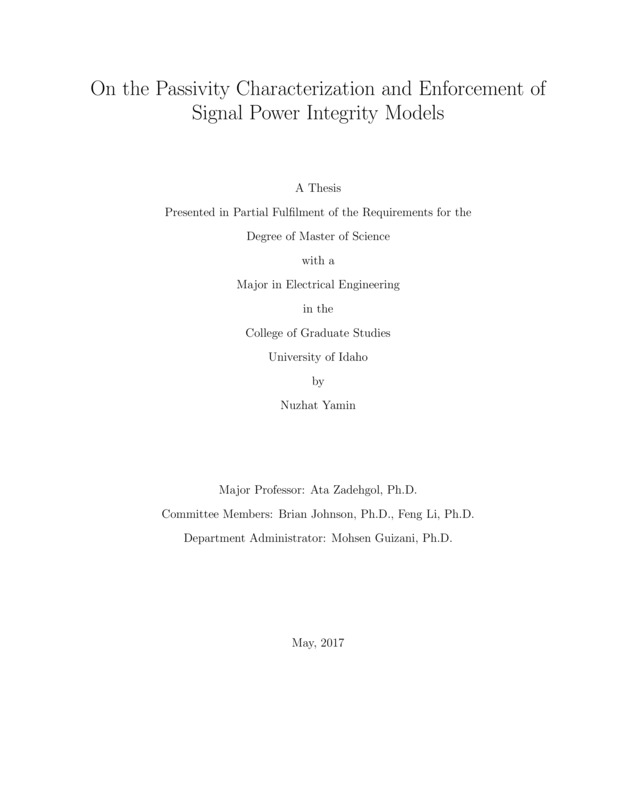On the Passivity Characterization and Enforcement of Signal Power Integrity Models
Yamin, Nuzhat. (2017). On the Passivity Characterization and Enforcement of Signal Power Integrity Models. Theses and Dissertations Collection, University of Idaho Library Digital Collections. https://www.lib.uidaho.edu/digital/etd/items/yamin_idaho_0089n_11084.html
- Title:
- On the Passivity Characterization and Enforcement of Signal Power Integrity Models
- Author:
- Yamin, Nuzhat
- Date:
- 2017
- Embargo Remove Date:
- 2017-12-12
- Keywords:
- Enforcement Integrity Passivity Power Signal Verification
- Program:
- Electrical and Computer Engineering
- Subject Category:
- Electrical engineering
- Abstract:
-
In recent years, with the ever increasing operating frequencies, signal-power integrity analysis in high-speed interconnect systems is becoming increasingly important. Passivity is an integral property of such analyses, as a non-passive system may produce complexities when interfaced with other systems. Passivity needs to be verified and ensured during macromodelling of large interconnects systems. In general terms, a system is regarded as passive if it consumes energy.
Due to the importance of passivity in global systems simulation, many theories and methods addressing passivity verification and enforcement have been proposed. This thesis conducts a study of system passivity, starting from an overview of macromodeling of interconnect systems. Passivity definitions from various perspectives, conditions and requirements for passive systems and difference available passivity verification and enforcement methods are presented.
In this thesis paper, we have made four main contributions: (i) we demonstrated a technique to verify passivity by realizing a 1 port system in the circuit domain. This technique has been verified by correlating with previously established passivity verification techniques, (ii) we have developed three algorithms to compute zeros from partial fraction form of rational function to assess passivity, and (iii) we develop a technique using 3-point data samples to extrapolate frequency domain response of macromodels to DC-point as a pre-processing of data before simulation of macromodels and (iv) We made a Python implementation of Second Order Arnoldi Passive Model Order Reduction (SAPOR) method. All these methods are successfully tested on several analytic and simulated examples that represent interconnect macromodeling systems to show accurate performance of the proposed techniques.
- Description:
- masters, M.S., Electrical and Computer Engineering -- University of Idaho - College of Graduate Studies, 2017
- Major Professor:
- Zadehgol, Ata
- Committee:
- Johnson, Brian; Li, Feng
- Defense Date:
- 2017
- Identifier:
- Yamin_idaho_0089N_11084
- Type:
- Text
- Format Original:
- Format:
- application/pdf
- Rights:
- In Copyright - Educational Use Permitted. For more information, please contact University of Idaho Library Special Collections and Archives Department at libspec@uidaho.edu.
- Standardized Rights:
- http://rightsstatements.org/vocab/InC-EDU/1.0/

